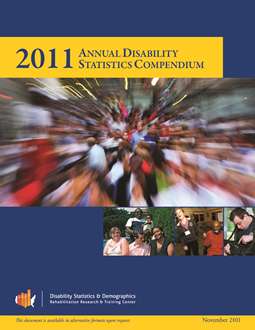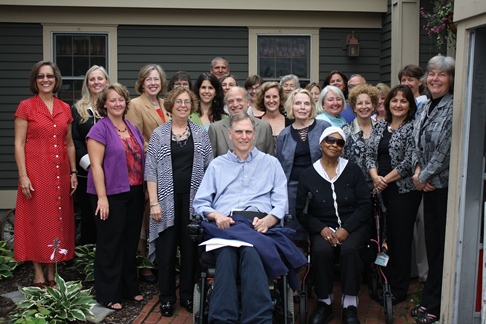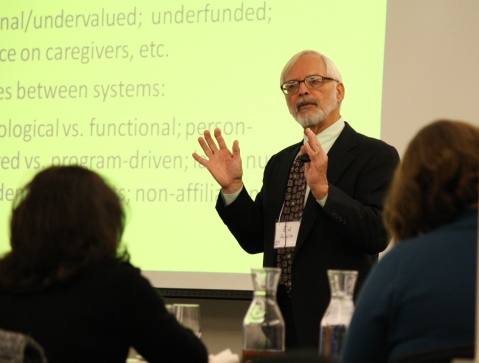NH Institute on Disability (UCEDD) Focuses on Aging and Long Term Care
November 30, 2011
Celebrating Real Choice
New Hampshire celebrated over 10 years of Real Choice long-term care grants at a luncheon in September 2011. The event welcomed representatives from the NH Department of Health and Human Services, community organizations, self-advocates, and other key stakeholders to reflect on past accomplishments and look toward the future of community-based long term care. "We have changed the face of long term care in New Hampshire," said Mary Maggioncalda, Administrator of Community Programs and Long Term Care at the NH Bureau of Elderly and Adult Services. "These initiatives have had the ability to bring people together, develop consensus, and get people on board with systems change."
Real Choice stakeholders gather to celebrate
Real Choice is known for its success in infusing a person-centered approach across multiple human service systems, its success in transitioning numerous individuals from institutional facilities to home and community-based services, and its annual conferences to disseminate best-practice information about community-based long-term care services in NH. Real Choice was also involved in the development and enhancement of ServiceLink, a local network of 13 free information and referral resource centers where individuals can ask questions and be connected to services for healthy and independent living.
"While much has been accomplished over these past ten years, we still have much to do and many challenges facing us over the next several years," said Sue Fox, director of several Real Choice grants at the IOD. "The aging of NH's population will present new challenges for the state in supporting all residents to live and age in the communities of their choice."
For more information on Real Choice, visit www.realchoicenh.org.
IOD Launches Online Person-Centered Planning Tool
Planning for and providing support to a loved one aging or living with a chronic illness or disability is a common experience for almost everyone at some point in life. The process, however, can be arduous and presents a number of challenges that prevent individuals from living as they choose. The path to navigate the maze of medical and community supports can be complex and time consuming. Individuals and families often struggle to define and create a network of supports, and service providers frequently experience significant time and funding constraints. With the help of Look Back, Plan Forward, a new website launched by the IOD in November 2011, individuals with disabilities and people who are aging have a place to record and reflect on important life events in a web-based timeline. When it is used by family caregivers and services providers as a framework for planning tailored services and supports, this online record can prove invaluable for understanding and focusing on the individual's desires and preferences.

"We are very excited about the launch of this online tool for person-centered planning," said Susan Fox, Institute on Disability project director. "We hope that individuals with disabilities and people who are aging will find it to be a useful resource in capturing their life history in a way that is simple to use and can be shared with others." After creating a profile, site visitors can:
- Enter their personal history.
- Print and share their history with family, friends, health care or home care providers, and others who can support them in the way they prefer.
- Save their history so they can update it over time. All personal information is password-protected, and sharing of personal information is at the sole discretion of the site user.
For more information on how to create a timeline, visit lookbackplanforward.com.
IOD Releases National Disability Statistics
The UNH Institute on Disability and its partners released the 2011 Annual Disability Statistics Compendium at a workshop at the U.S. Capitol on November 2, 2011. The Compendium, published as a printed report and web-based tool, pools yearly disability statistics from various federal agencies, making finding and using disability statistics easier. It is designed to serve as a reference guide for disability advocates, policymakers, researchers, and those working on legislative and other matters relating to people with disabilities.
The release of the Compendium was accompanied by two public events, a briefing and the first annual Research-to-Policy Roundtable, at the U.S. Capitol Visitor Center in Washington, D.C. In addition, the briefing was webcast live on the Research on Disability website (www.researchondisability.org). The Compendium release briefing included several presentations on the sources and uses of disability statistics.The Research-to-Policy Roundtable provided an opportunity to discuss ways that research can assist policymakers in developing better coordination between safety net programs and employment services for persons with disabilities.

The Compendium is produced annually by the Rehabilitation Research and Training Center on Disability Statistics and Demographics (StatsRRTC), a joint effort of the UNH Institute on Disability and Hunter College in collaboration with the American Association of People with Disabilities, the Center for Essential Management Services, the Council of State Administrators of Vocational Rehabilitation, Cornell University, and the Center for Studying Disability Policy at Mathematica Policy Research. StatsRRTC is funded by a cooperative agreement from the National Institute for Disability and Rehabilitation Research. To access the Compendium data in a searchable, sortable format online, visit www.disabilitycompendium.org.
To download a PDF of the report or request a hard copy, visit www.iod.unh.edu or www.researchondisability.org.
UNH Launches Center on Aging and Community Living
The University of New Hampshire's Center on Aging and Community Living (CACL) hosted over 80 UNH faculty and community partners at their fall launch event, New Perspectives on Aging, on October 6, 2011. The program brought together key stakeholders to discuss issues related to the aging of NH's population. It explored ways for the CACL to build relationships between UNH and state and community partners to better support older adults to live and age in the communities of their choice. "We want to help individuals move away from simply piecing life together to living a full life in the community," said Ned Helms, director of the New Hampshire Institute for Health Policy and Practice (NHIHPP), during his welcome remarks. "By tapping into faculty resources and growing our partnerships with the state, the CACL hopes to be the vehicle for shaping a system to support and achieve this goal." Dr. Edward Ansello, Director of the Virginia Center on Aging and Director of the Virginia Geriatric Education Center at Virginia Commonwealth University, addressed the group, discussing the intersections of aging and disability values, service provision, and public policy in his keynote presentation. He encouraged the work of the CACL and its stakeholders to move forward in creating a stronger network and coalition for change. A panel responded to Dr. Ansello's address, reflecting on how the CACL can support the work of state government, University faculty and staff, community agencies, advocates, and state legislators. Panel members included Nancy Rollins, Associate Commissioner, NH Department of Health and Human Services; Joan Hahn, Professor of Nursing, UNH; Susan Ruka, Vice President, Elderly and Quality Services, Memorial Hospital, North Conway, NH; Barbara Salvatore, Community Advocate; and Laurie Harding, Legislator, NH House of Representatives.
Dr. Edward Ansello presents at the CACL launch event
The CACL is a collaboration between the Institute on Disability and NHIHPP at UNH. Having been actively engaged in projects related to aging and long term care issues for a number of years, the CACL was established to coordinate the work of both institutes, maximize available resources, and provide assistance to state agencies and community organizations. For more information on the CACL, visit www.agingandcommunityliving.org.









